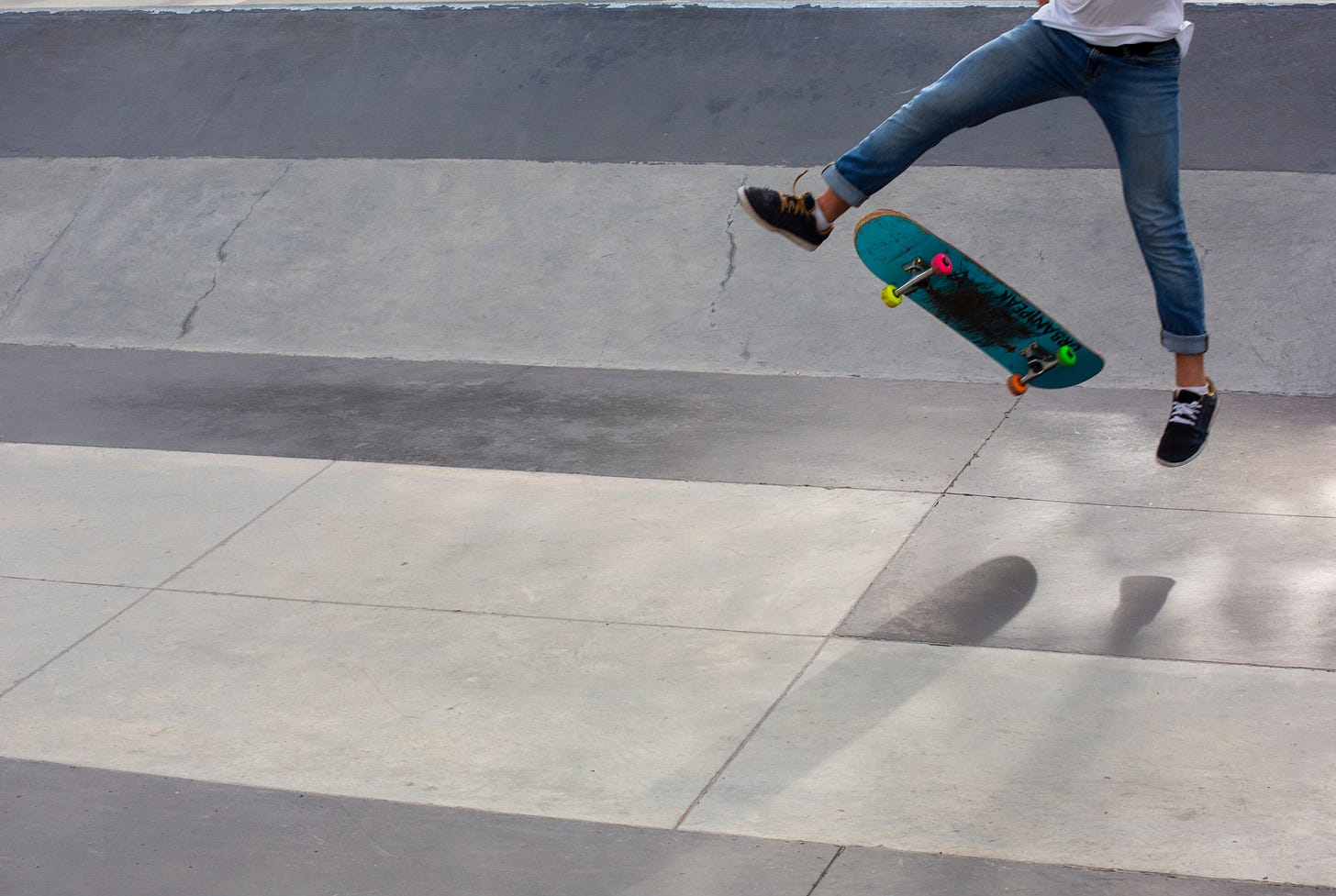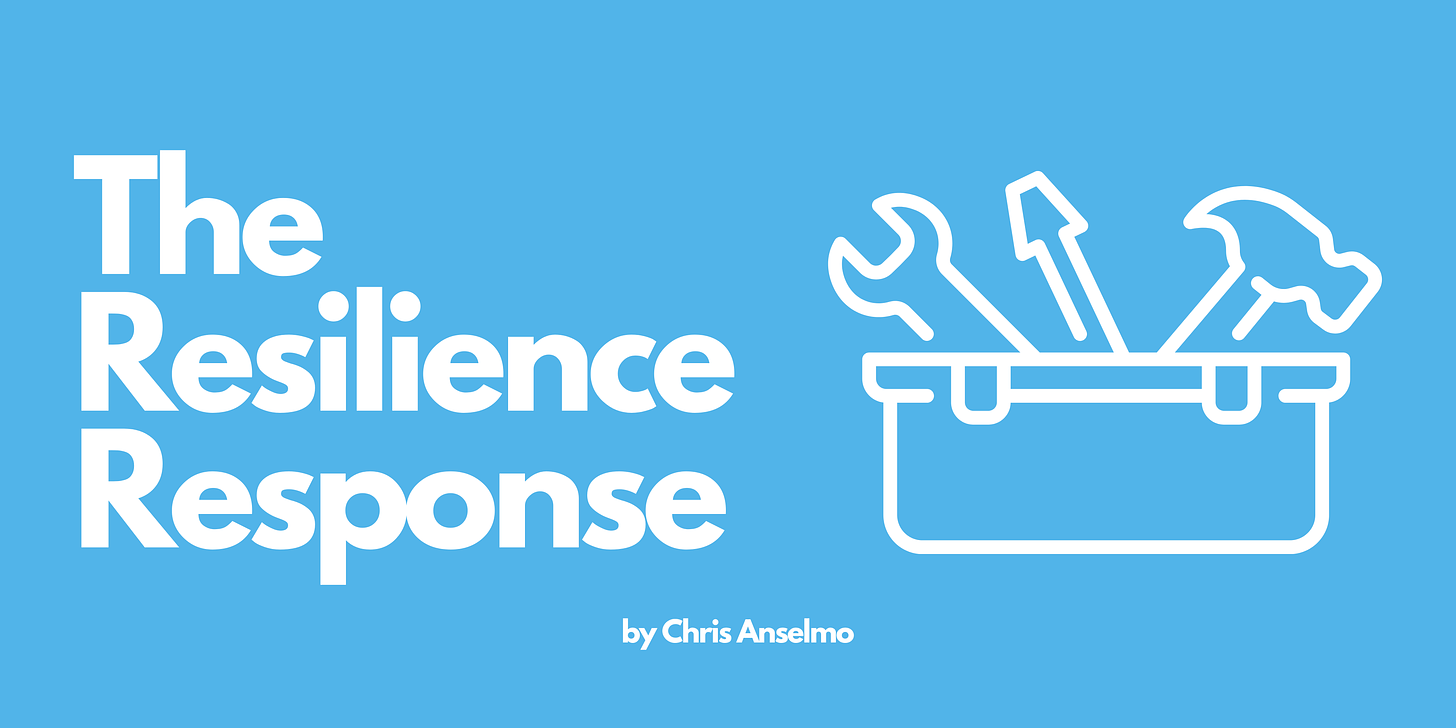The Resilience Response #7 - October 7, 2023
Why it's okay to be an amateur, Patric Young on finding purpose after a life-changing accident, a helpful practice to end my day, inflatable donuts, and more.
Happy Saturday!
Welcome to The Resilience Response, a newsletter that provides the tools and resources you need to face adversity with confidence.
Dear reader, I was wondering if you could help me with something today. (It will be quick, I promise.)
I am currently brainstorming additional paid subscriber benefits and would value your input.
All the Wednesday and Saturday posts will remain paywall-free, but I would like to add a few new benefits to enhance the paid subscription tier. I am considering the following options:
A monthly audio post (with transcription) where I discuss recent articles I’ve written. This will allow me to explore topics in greater depth and share additional examples from my life.
Article and book recommendations based on what I’m reading
Paid subscriber-only discussion threads
A free copy of any book/e-book I write in the future
If you are a current paid subscriber, or are considering a paid subscription, which benefit is most appealing?
I’ll report the results next week. (If there is another benefit you want to see, please reply to this email or leave a comment.)
Your help is greatly appreciated! At the end of the day, I just want to make sure that I am creating useful content.
Since we are on the topic, if you would like to upgrade to support my efforts, you can do so here:
Here’s what’s on deck this week:
🔧 For the Toolkit: Be an amateur!
🎙️ In the First Person: Patric Young on moving forward after a life-changing accident
📚 What’s Helped Me: Writing down ten good things that happen each day
✍️ Weekly Intention: Make your own “Ten Good Things” list
🎁 Outtakes and Extras: World Mental Health Day, inflatable donuts, the $1000 Breakfast Club, and a groundhog gets stuck in a car
🔧 For the Toolkit: Be an amateur!

We all have hobbies and interests that we want to get better at — maybe even turn into a career or side gig — but the thought of “putting ourselves out there” fills us with trepidation.
Because we are not “experts” at writing science fiction, or photography, or playing the guitar (or for me, coming up with examples), we think that we don’t have anything worth sharing with the world.
We are afraid of being labeled an amateur, so we keep our passions to ourselves. And the world is worse off for it.
This fear extends beyond hobbies and interests. For example, maybe you have a compelling personal story, but because you’ve never been good at public speaking, you think that no one wants to hear you struggle through a speech. Or maybe you want to advocate for a cause near to your heart but feel that you won’t be taken seriously without a deep understanding of policy issues.
On the surface, this fear seems reasonable. After all, if we aren’t good at something, aren’t we just setting ourselves up to be mocked and ridiculed?
In his book, Show Your Work!, author
refutes the idea that being an amateur is a bad thing. Yes, there are certain instances where expertise is important — we don’t want a first-time pilot flying a 747 — but in almost every other situation, it’s okay to tell people we are learning as we go.For Kleon, being an amateur is desirable:
We’re all terrified of being revealed as amateurs, but in fact, today it is the amateur—the enthusiast who pursues her work in the spirit of love (in French, the word means “lover”), regardless of the potential for fame, money, or career—who often has the advantage over the professional. Because they have little to lose, amateurs are willing to try anything and share the results. They take chances, experiment, and follow their whims. Sometimes, in the process of doing things in an unprofessional way, they make new discoveries.
Being an amateur is nothing to fear. When we move past our trepidation, we can see that it has several benefits:
We can improve quickly. Once we stop procrastinating, we can get better at what we love. Improvement comes from practice. Says Kleon: “The gulf between bad and good creative work is smaller than not starting vs. starting.”
Making mistakes is a sign of authenticity. In the book, Kleon mentions that mistakes give us credibility when we are open to learning in front of others. We may not be an expert, but we aren’t pretending to be one either. This makes us more relatable.
It helps us find our support system. Being an amateur gives us permission to open up and be ourselves. When people are sharing and talking about what they love, without having to worry about looking like an expert, it builds community. Lifelong friends are made. When we find others who share our interests, it makes us feel less alone and gives us another reason to persevere through our difficulties.
If there is something you are passionate about or would love to do more of, just get started. We can never have enough joy in this world! Don’t keep yourself from exciting new experiences out of fear of looking like an amateur.
If you’re still hesitant, Show Your Work! is a quick read and can provide a major confidence boost.
🎙️ In the First Person: Patric Young on moving forward after a life-changing accident
Patric Young is a former college basketball player for the Florida Gators who was paralyzed below the waist in a car accident in July 2022. I remembered him from his playing days but hadn’t been following his career closely until I saw a news story about his accident and recovery.
As I’ve written about many times before, I cringe when people are called “inspirational” simply because of their disability, as if getting out of bed and facing the day is an act of unparalleled bravery. (What else are we supposed to do?) But Patric has earned the word. The longer I follow his journey, the more I am inspired to be a better person and use my life experience in service of others.
Sometimes when you see people and they look happy and cheerful it’s clear it’s just a façade. But with Patric, his optimism is genuine. Although he admits this isn’t how he would have drawn up his life, he is committed to helping others who have dealt with similar life-changing accidents.
The video below provides a nice overview of his story. In his own words, Patric discusses life after the accident and how he’s made the most of a difficult hand.
In the video, Patric discusses an obstacle race his foundation was organizing for people of all abilities. It was supposed to have taken place in July, but unfortunately, the race had to be postponed due to his ongoing health issues.
Here’s hoping for a speedy recovery!
📚 What’s Helped Me: Writing down ten good things that happen each day
Many days are a grind. By 9 or 10 p.m., I am exhausted, achy, and thinking about all that I failed to accomplish.
The end of the day is when I am most prone to negative self-talk. It’s important I don’t carry this negativity to bed, otherwise, I’ll be up half the night ruminating about who-knows-what. Thankfully, this isn’t as much of an issue as it used to be.
A few years ago, I started listing out ten good things that happened each day. I needed to force myself to see the good in my life and not dwell on the negatives. The practice has many commonalities with a gratitude journal but the list is quicker and less formal. Ten things. No full sentences required. Short and sweet.
On days when it’s hard to find any positives, I list out everything I still have in my life. Even if I had a bad day, I can still be grateful for my family and my health. This process is a boost to my self-esteem and restores perspective. Negativity is not the only option.
The timing of this practice is flexible. You can make the list at the end of the day, or if you prefer, in real-time as good things happen. If you take the latter approach, just make sure that you review the list right before bed. This helps to calm anxious thoughts.
No matter how frustrating life can get, good things are happening all around us, if we know where to look.
✍️ Weekly Intention: Make your own “Ten Good Things” list
If you already keep a gratitude journal, great! No homework this week.
For everyone else, this week’s intention is to get in the habit of writing down ten good things that happened each day. If you are struggling to come up with ten, write down what you’re grateful for. No item is too small.
I’ll share my list for yesterday in the comments.
🎁 Outtakes and Extras
World Mental Health Day - I’m a little early, but World Mental Health Day is October 10th. The objective of the day is to raise awareness for mental health issues and mobilize support for mental health initiatives.
We could all benefit from better mental health. If you are struggling, know that you are not alone!
A few links found while going through my backlog….
Inflatable donuts! - 100 dollars. Zero calories.
The $1,000 breakfast club - Random acts of kindness are the best. And yes, this is a better use of $1,000 than buying ten inflatable donuts. (But just barely.)
Car wash workers find groundhog in front bumper of customer's car
"After we got him out, he ran to the back of the car and hopped up in the rear suspension. Had to take off the left rear tire to get him out."
😂😂😂
Have a great week everyone!





My 10 good things list from Saturday:
1. My family and friends - every day with them is a blessing
2. We've gotten a ton of rain here recently. We were supposed to get another rainstorm but it turned out to be just a few passing showers.
3. My friend Maddie's post got featured in the weekly Substack Reads newsletter
4. I scoped out next week's Resilience Repsonse post (I have struggled to be proactive in doing this)
5. This post published successfully. All the links are correct (unlike last week!)
6. I'm noticing that my swallowing issues have subsided, at least a little bit. Hopefully this continues.
7. I made significant progress on my upcoming Wednesday post
8. I got a good night's sleep (no small feat)
9. I texted with two friends I hadn't spoken to in a while.
10. Playoff baseball!
I love the idea of Ten Good Things List. When I do my journal at the end of the day, I usually list activities that I participated in that I felt good doing. Be it exercising, even if for a few minutes for that day, spending less time on social media or even calling a loved one. I call them wins of the day and I like the approach of gratitude. Thank you.